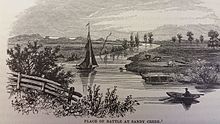Battle of Big Sandy Creek
| Battle of Big Sandy Creek | |||||||
|---|---|---|---|---|---|---|---|
| Part of the War of 1812 | |||||||
 Battle of Big Sandy Creek |
|||||||
|
|||||||
| Belligerents | |||||||
|
|
|
||||||
| Commanders and leaders | |||||||
| Stephen Popham | Melancthon Taylor Woolsey | ||||||
| Strength | |||||||
| 153 marines and sailors | 250 regulars 125 Indians |
||||||
| Casualties and losses | |||||||
| 13 killed 140 captured (30 of whom were wounded) |
2 wounded | ||||||
The Battle of Big Sandy Creek was fought in northwestern New York on May 29–30, 1814, during the War of 1812. The battle was an American victory in which American militia and Oneida Indians launched a surprise attack on British soldiers who were chasing them inland from Lake Ontario.
After the successful attack on Fort Oswego on May 5–6, 1814, the British withdrew to the Galloo Islands in northern Lake Ontario where they could monitor and intercept any supplies on their way north to Sackets Harbor, New York. At the American ship yards in Sackets Harbor, two brigs, the USS Jefferson and the Jones, and a frigate, the Superior, waited for armament and rigging necessary for their launch. The supplies needed to outfit the ships had been transported from the Brooklyn Naval Yards on Long Island to Albany, New York, and from Albany up the Mohawk River to Wood Creek and Oneida Lake, finally arriving at the Oswego River. These supplies still needed to be transported from Oswego to Sackett’s Harbor, but it needed to be done without alerting the British.
On April 21, 1814, Commodore Isaac Chauncey sent orders from Sackets Harbor to Lieutenant Melancthon Taylor Woolsey directing him to choose five officers and twenty-five men to proceed in the USS Lady of the Lake to Oswego and then bring the shipbuilding supplies north to the shipyards.
...
Wikipedia
